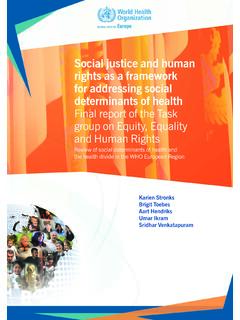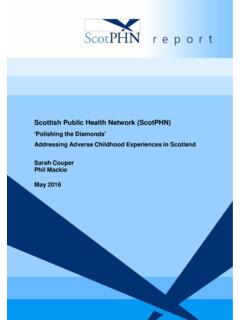Transcription of Social Exclusion Meaning, measurement and experience and ...
1 Social Exclusion literature review September 08 1 Social Exclusion Meaning, measurement and experience and links to health inequalities A review of literature Jane Mathieson, Jennie Popay, Etheline Enoch, Sarah Escorel, Mario Hernandez, Heidi Johnston and Laetitia Rispel WHO Social Exclusion Knowledge Network Background Paper 1 This work was made possible through funding provided by the World health Organization (WHO) via Lancaster University.
2 It was undertaken as work of for the Social Exclusion Knowledge Network established as part of the WHO Commission on the Social determinants of health (CSDH). The views presented in this report are those of the authors and do not necessarily represent the decisions, policy or views of WHO or CSDH Commissioners. Contact: Professor Jennie Popay Institute for health Research Lancaster University, UK +441525592493 +7734058761 Social Exclusion literature review September 08 2 Contents Main report I.
3 Introduction II. Origins of the concept of Social Exclusion III. The meanings of Social Exclusion IV. Exclusionary processes V. Alternative and parallel discourses VI. Measuring Social Exclusion VII. Narratives on the experience of exclusionary processes VIII. Social Exclusion and health inequalities IX. A Synthesis and framework for the WHO Social Exclusion Knowledge Network References Appendix 1: Definitions of Social Exclusion Appendix 2: Abbreviations Social Exclusion literature review September 08 3 1.
4 Introduction .. Social Exclusion is a theoretical concept, a lens through which people look at reality and not reality itself . (de Haan, 2001:28) Social Exclusion has become central to policy and academic discourse in Western Europe, and increasingly in other parts of the world. It is the focus of one of nine global Knowledge Networks established to support the work of the World health Organisation s (WHO s) Commission on Social determinants of health (CSDH). The literature review reported here was undertaken by the WHO Social Exclusion Knowledge Network (SEKN) to inform its own work and the work of the Commission.
5 The CSDH final report was published in August 2008 and can be found at The objectives of this literature review have been to explore the meanings attaching to the concept of Social Exclusion and to start to consider their implications for policy/action in general and for the work of the WHO Commission in particular. In the first section of the review, explanations offered for the rise to prominence of the concept from the 1970s are considered. The next two sections focus on the ways in which Social Exclusion is defined highlighting how the concept takes on different - often taken for granted - meanings, according to the theoretical, ideological, and personal perspectives in which it is embedded and the nature of some of the exclusionary processes at work around the globe.
6 This is followed by two sections that consider in turn some of the quantitative approaches to measuring Social Exclusion and the insights offered by narratives or personal stories of Social Exclusion . The review then moves on to explore the relevance of the concept of Social Exclusion for our understanding of the causes of health inequalities and in particular for the theoretical model underpinning the work of the WHO Commission on Social determinants of health . The final section brings together the different strands of the review in order to outline a conceptual framework to guide the work of the WHO Social Exclusion Knowledge Network.
7 The literature has been reviewed using a traditional narrative approach involving a thematic analysis rather than a higher order synthesis. Our starting point in identifying relevant literature was a bibliography produced during an initial scoping phase of the work of the SEKN. This was extended through searches of: selected electronic databases (ASSIA, PubMed, google); key websites (eg CASE, ILO); library catalogues (Lancaster University Library; Wellcome Library, London); expert contacts, including references identified by the SEKN regional hubs in Latin America, Southern Africa and South East Asia; and reference chaining.
8 Searches sought literature on: approaches to defining and measuring Social Exclusion ; experiences of Social Exclusion ; and the relationship between Social Exclusion and health disadvantage. The included literature is very diverse spanning theoretical literature, findings from qualitative and quantitative research, and non-research sources. The review has not covered all of the potentially relevant literature. The included literature emanates largely from the northern hemisphere where Social Exclusion literature review September 08 4 the concept of Social Exclusion originated.
9 It was restricted primarily to the English language. Although some papers from the southern hemisphere and papers in Spanish and Portuguese were accessed through SEKN regional hubs we are aware that there is considerable literature in other languages that we have not taken into account. Other work by the SEKN has underlined the limits of the global salience of Social Exclusion , while at the same time recognising useful aspects of the discourse, in particular the extended focus beyond financial poverty, its emphasis on processes driving inequalities and on relational interdependence as the driving force in Social life (Popay et al.)
10 , 2008). The SEKN has identified alternative discourses focusing on similar realities as those viewed through the lens of Social Exclusion but which may have greater policy and/or action purchase in some countries and/or regions. The SEKN did not have the time or resources to undertake a comprehensive review of the non-English literature nor to expand this work to these proximal concepts. However, input from members of the SEKN, and other reviewers, has extended the global reach of the review, albeit in a modest way.















